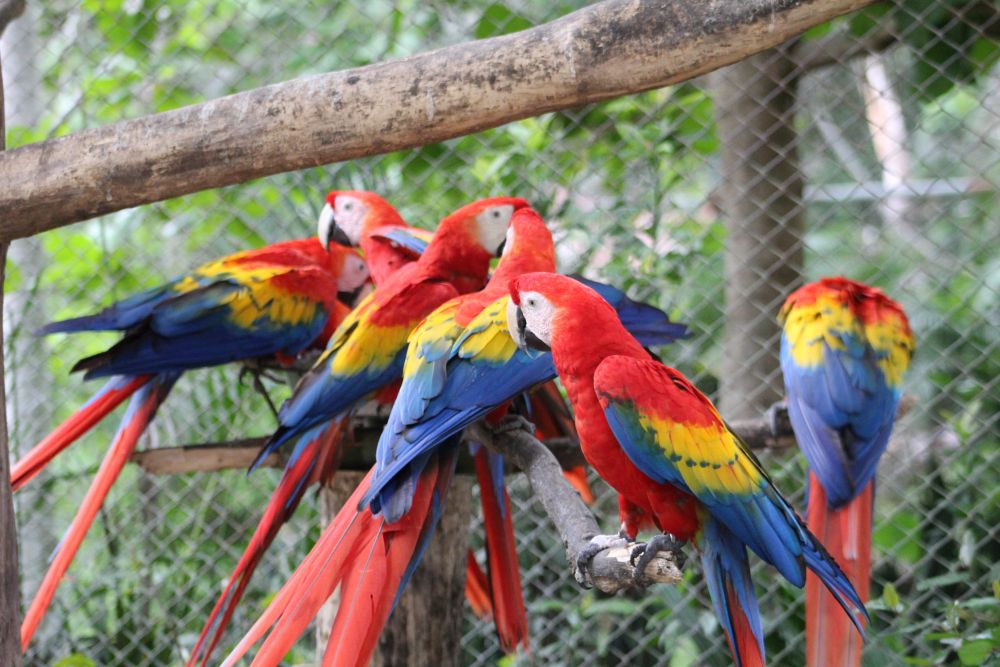Illegal trade exacerbates the conservation challenges for Costa Rican parrots
The team discovered native parrots being kept in captivity in nearly 87% of the areas visited and over 80% of the households surveyed, clearly demonstrating that habitat protection is insufficient to ensure their conservation

Scarlet Macaws (Ara macao) at a wildlife rehabilitation center in Costa Rica, rescued from the illegal trade. Photo: Pedro Romero-Vidal
A study led by the Doñana Biological Station (EBD-CSIC) reveals that parrot conservation in Costa Rica faces a dual challenge: habitat transformation and the illegal wildlife trade. Although the country is globally recognized as a model of environmental conservation, with over 26% of its territory declared protected areas, the scientific team confirmed that creating protected areas is not sufficient on its own. The study's results, published in the journal Diversity & Distributions, show that the practice of keeping wild-caught parrots as pets, which has been illegal since 1983 but is deeply rooted in the country's culture, poses a significant threat to native parrot species, including endangered macaws and Amazon parrots.
A nationwide survey
The scientific team, composed of researchers from the Doñana Biological Station, the National Museum of Natural Sciences, Miguel Hernández University, and Pablo de Olavide University, conducted a broad-scale survey across the country. To do this, they traveled almost 2.000 kilometers of roads to census all native parrot species. In total, they covered 949 patches of different habitats and recorded over 1.236 observations at various points. This approach allowed them to record the presence, abundance, and species richness in all types of environments, from primary forests to highly transformed areas, such as agricultural settings and urban localities.
The data collected in the field was supplemented with satellite information on forest cover, agricultural land use, and levels of human pressure, as well as the distance to protected areas. Furthermore, by conducting interviews with members of rural communities, the team documented the illegal keeping of parrots as pets in numerous localities across the country, recording all available information about the illegally held specimens.
Parrots kept as pets in more than 80% of homes surveyed
"This study confirms something that is evident for most species: parrot diversity and abundance decrease significantly in agricultural areas", explains Pedro Romero Vidal, a researcher at the Doñana Biological Station. However, in the case of this group of birds, some species show a certain tolerance for highly transformed environments like human settlements.
“Up to this point, we wouldn't necessarily be concerned,” the researcher continues. “However, the most alarming finding was the magnitude of the illegal trade in a country that is an example of environmental protection on a continental, and even global, scale: native parrots were found illegally kept as pets in 86.6% of the localities visited and in over 80% of the households surveyed.”
The analysis also revealed that the most endangered species are simultaneously the most coveted for the illegal pet trade, a situation that could generate significant conservation problems. The selective extraction of macaws and Amazon parrots, which are very scarce in the country and are the focus of specific conservation projects, not only threatens the viability of their wild populations but also the health of the ecosystems where they fulfill key ecological functions, such as seed dispersal.
Protecting habitat is not enough
"Conservation in the country cannot be based entirely on habitat protection. While the network of protected areas has succeeded in reversing decades of deforestation that preceded current biodiversity conservation policies, the pressure from the illegal wildlife trade remains a significant threat," concludes José Luis Tella, a researcher at the Doñana Biological Station.
The team calls for stronger law enforcement, the implementation of stricter measures against the illegal wildlife trade, and, crucially, a cultural shift to reduce the demand for wild-caught parrots as pets. “Otherwise, even in countries pioneering environmental policies, such as Costa Rica, emblematic species and the ecological services they provide run the risk of disappearing,” warns the researcher.
Reference:
P. Romero-Vidal, J.M. Barbosa, G. Blanco, F. Hiraldo, M. Carrete, J.L. Tella. Habitat Protection Alone Is Insufficient: Costa Rican Parrots Thrive in Altered Landscapes but Remain Vulnerable to Poaching. Diversity and Distributions. https://doi.org/10.1111/ddi.70084